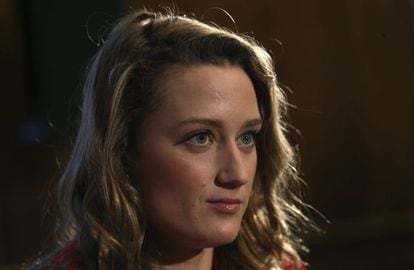Mireia Belmonte: “There’s a world of difference between silver and gold”
The Olympic swimming medalist explains how she’s preparing to go one better in Rio

Spanish swimmer Mireia Belmonte saw her marvelous 2014 – six medals in the European championships, four in the world championships and three world records – recognized in Madrid on Monday as she picked up an AS Sports Awards. Beforehand, though, the 24-year-old double Olympic silver medalist spoke about how she was preparing for her assault on gold at the 2016 Rio Games and about battling her fears in the loneliness of the pool.
Question. You are allergic to chlorine, which could affect you in competition; sometimes you lose count of how many lengths you have done; and you face the pressure of swimming as the favorite. How do you control all that?
Answer. I never know when I’m going to have an anxiety attack, an asthma attack, or when I’m going to be ruled out. It is very difficult to control those moments. I work with a sports psychologist. We have done some good work: I have controlled these situations and not lost hope.
I think to myself, if I am capable of doing this, why am I not going to be capable of doing the other thing?”
Q. Tennis players go from point to point, soccer players go match to match…
A. ...and I go meter by meter. You might see the race on TV and think: “Ugh, Mireia is already dead in the first 300 meters.” I have to know not to lose my calm, wait for my moment and then put on the pressure.
Q. Fred Vergnoux, your coach, says he is a specialist in breaking his pupils’ comfort zones. What was yours?
A. I surprised myself doing things I didn’t know I could do. Before Fred I had only done one 5,000m test run going as fast as possible. Now I do one a week. I didn’t know I was capable of doing it. And every week I improve. Other things: lifting so much weight in the gym. It was unimaginable. When I do it, I think, “If I can do this, why wouldn’t I be able to do the other thing?”
Q. The gym work has transformed you physically.
A. I have a lot more muscular weight and I am much more defined. I have lost fat. I have lost a bit of weight.
Mireia’s medals
Olympic Games: Two silvers (200m butterfly and 800m freestyle). Total: 2.
FINA World Aquatics Championships: Two silvers (200m butterfly and400m medley) and one bronze (200m freestyle). Total: 3.
FINA World Swimming Championships (25m): Seven golds (200m butterfly, 400m medley, 800m freestyle, 400m freestyle, 200m butterfly, 200m freestyle, 400m medley); two silvers (800m freestyle and 200m medley) and one bronze (400m medley). Total: 10.
European Aquatics Championships: four golds (200m butterfly, 1,500m freestyle, 200m medley and 1,500m freestyle); three silvers (400m medley, 800m freestyle and 400m freestyle) and three bronzes (400m freestyle, 5km and 200m butterfly). Total: 10.
Short-course world records: 5.
Q. You conquered those physical barriers, but what about the mental ones?
A. Believing that I am the best. That’s very important. I never give up in a race, no matter how lost it may look. I always fight until the last meter. Even if I finish sixth, I take positive things from each competition.
Q. When did you start believing you could be the best in the world?
A. Since I was a little girl, I have always wanted to be the best, since I started to compete at the age of six. I already had that inside me. Afterwards, I think of everything I have done this season, about the really tough training sessions… and I ask myself: “If I have done all that, why am I not going to be the best?”
Q. You’re fighting to achieve that against Hungary’s Katinka Hosszú and the US’s Katie Ledecky. What sets them apart?
A. Both are very strong mentally. Hosszu, for example, gets into the pool six times in an afternoon. You have to be a bit wrong in the head to do that. She is very strong mentally. Ledecky is the same. Technically they are very good, impressive. They have gifts. They are given to you, and you either accept them or you don’t.
Q. What do you have that they wouldn’t want?
A. My stubbornness. I kept up a nice duel with Hosszu in the World Cup. She won. I won. You didn’t know who was going to win… and it is important to know how to manage it, for me not to give up, to always know that I can win. Sometimes it’s very difficult. The psychological work is very important.
Q. How do you make up the distance between Olympic silver and gold?
High-level athletes are used to living with pain. I can control it, I know how to endure it. A gold medal is worth a lot”
A. There is a world of difference between silver and gold. Even if the distance is a second-and-a-half, to earn the gold you have to almost triple what you did before. You have to suffer and enjoy the journey.
Q. How much does it hurt to win a medal?
A. High-level athletes are used to living with pain. I see it when I compare myself with people who don’t do sport. I can control the pain, I know how to endure it. A gold medal is worth a lot. We make a lot of sacrifices; we have to have a lot of determination, to know to do everything you need to do in the moment you need to do it, and to give up other things that are not going to help you to the medal. […] I’ve been wearing the same shoes since September. It’s so my body doesn’t feel anything strange, so that I don’t end up with any strange injuries. Even in July I make sure I have a scarf around my neck so that I don’t catch a cold. They are small details that in the end make the difference. Having these things in your head is what we have in common.











































